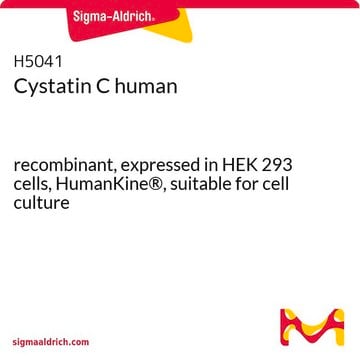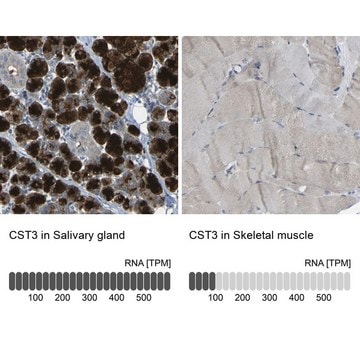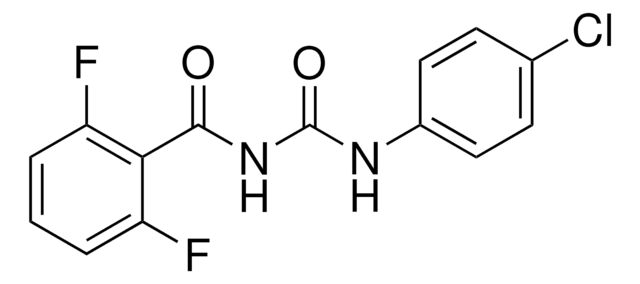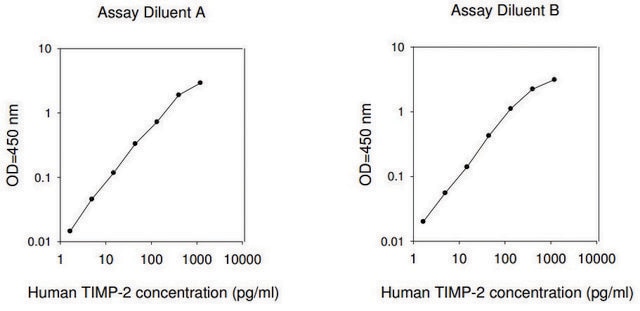RAB0105
Human Cystatin C ELISA Kit
for serum, plasma, cell culture supernatant and urine
Synonym(s):
Cystatin-3, Cystatin-C
Sign Into View Organizational & Contract Pricing
All Photos(2)
About This Item
UNSPSC Code:
41116158
NACRES:
NA.32
Recommended Products
species reactivity
human
packaging
kit of 96 wells (12 strips x 8 wells)
technique(s)
ELISA: suitable
capture ELISA: suitable
input
sample type plasma
sample type urine
sample type serum
sample type cell culture supernatant(s)
assay range
inter-assay cv: <12%
intra-assay cv: <10%
sensitivity: 300 pg/mL
standard curve range: 0.313-20 ng/mL
detection method
colorimetric
shipped in
wet ice
storage temp.
−20°C
Gene Information
human ... CST3(1471)
General description
The Human Cystatin C ELISA (enzyme-linked immunosorbent assay) kit is an in vitro enzyme-linked immunosorbent assay for the quantitative measurement of human cystatin C in serum, plasma, cell culture supernatants and urine.
Immunogen
Recombinant Human CystatinC
Application
For research use only. Not for use in diagnostic procedures.
Please refer to the attached General ELISA KIT Procedure (sandwich, competitive & Indirect ELISA)
Please refer to the attached General ELISA KIT Procedure (sandwich, competitive & Indirect ELISA)
Biochem/physiol Actions
Cystatin C (CysC) is released by all nucleated cells. Abnormal thyroid function, immunosuppressive therapy and systemic inflammation alter the levels of CysC. Mutation in the gene encoding CysC causes hereditary cystatin C amyloid angiopathy, which is a consequence of amyloid deposits containing the CysC variant in the brain.
Cystatin-C precursor (CST3) is an inhibitor of lysosomal cysteine proteases and several cathepsins like cathepsin S, a lysosomal enzyme. It has been shown that CST3 is a marker of glomerular filtration and diabetic kidney disease. In the presence of pathological conditions, it forms amyloid fibrils in brain arteries. Mutations in the gene encoding CST3 have been shown to be associated with a form of amyloidosis and age-related macular degeneration.
Other Notes
A sample Certificate of Analysis is available for this product.
Please type the word sample in the text box provided for lot number.
Please type the word sample in the text box provided for lot number.
Signal Word
Warning
Hazard Statements
Precautionary Statements
Hazard Classifications
Met. Corr. 1
Storage Class Code
8A - Combustible corrosive hazardous materials
Choose from one of the most recent versions:
Already Own This Product?
Find documentation for the products that you have recently purchased in the Document Library.
Customers Also Viewed
Critical Care Nephrology, 254-254 (2009)
Handbook of Neurochemistry and Molecular Neurobiology: Neural Protein Metabolism and Function, 254-254 (2009)
Assessing validity of serum cystatin C for predicting metabolic syndrome.
Asefy Z et.al.
Pakistan journal of biological sciences: PJBS, 17(4), 582-585 (2014)
Stroke in Icelandic patients with hereditary amyloid angiopathy is related to a mutation in the cystatin C gene, an inhibitor of cysteine proteases.
Levy E et.al.
The Journal of Experimental Medicine, 169(5), 1771-1778 (1989)
Yuanyuan Pei et al.
European journal of medical research, 27(1), 39-39 (2022-03-12)
Acute kidney injury (AKI) is a common and critical complication of sepsis, and is associated with unacceptable morbidity and mortality. Current diagnostic criteria for AKI was insensitive for early detection. Novel biomarkers including cystatin C, kidney injury molecule-1 (KIM-1), neutrophil
Our team of scientists has experience in all areas of research including Life Science, Material Science, Chemical Synthesis, Chromatography, Analytical and many others.
Contact Technical Service











